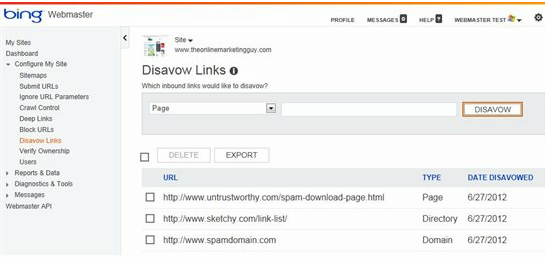Bing recently announced a new capability for marketers who see their site receive inbound links from low-quality sites around the web. Users of Bing’s Webmaster Tools can now disavow inbound links they receive from sites that Bing’s search crawlers may considered webspam. This may be good news for companies who feel spammy links have hurt their search presence, but many may be wishing Google had a similar feature – especially in light of the recent Penguin update.
For the most part, SEO campaigns are always in control of a marketer or webmaster. However, frequent unsolicited linking from some undesirable sites can have a negative impact on a company’s standing in search rankings.
Within Webmaster Tools, marketers now have the option to tell Bing to disavow certain links quickly with a few clicks of the mouse. Content marketing and other SEO strategies are most effective for marketers that monitor their web presence and actively participate in every element of their standing in search. The ability to control which inbound links are factored into search ranking is a new tool, but anyone hoping to succeed in Bing search should leverage it to boost effectiveness of the campaign.
The Bing disavow tool is precisely what many marketers who feel they’ve been unfairly hit by Google’s Penguin algorithm need. As Brafton reported, Penguin targets sites with link schemes – and some marketers struggle with unsolicited spammy links.
Given its dominance in the search market, Google typically receives most of the attention from organizations using SEO. However, a report from Experian Hitwise suggests that Bing is slowly gaining on Google. Hitwise found that Bing-powered search, which includes queries from Yahoo, accounted for 28.1 percent of queries in May 2012, while Google accounted for 65.02 in the month. Compared to the numbers for each search engine from one year ago, Hitwise said that Google has slipped 5 percent. Moreover, Bing increased by the same 5 percent.
Of course, search market share reports paint different pictures from company to company, as comScore’s most recent analysis found similar but different figures. Additionally, Bing’s partnership with Yahoo gives “Bing-powered search” and “Bing search” two wholly different meanings. Regardless, it’s clear that Bing has made some progress in the last year – even if Google still accounts for about two-thirds of the overall search market.
With its growing standing in the market and a greater focus on improving its ability to serve marketers, Bing has positioned itself well to provide Google with realistic competion. For users, Bing has also made changes it thinks will make it more useful and competitive. Brafton recently reported that Bing has rolled out new SERPs and local search to provide more diverse and relevant content through search.



